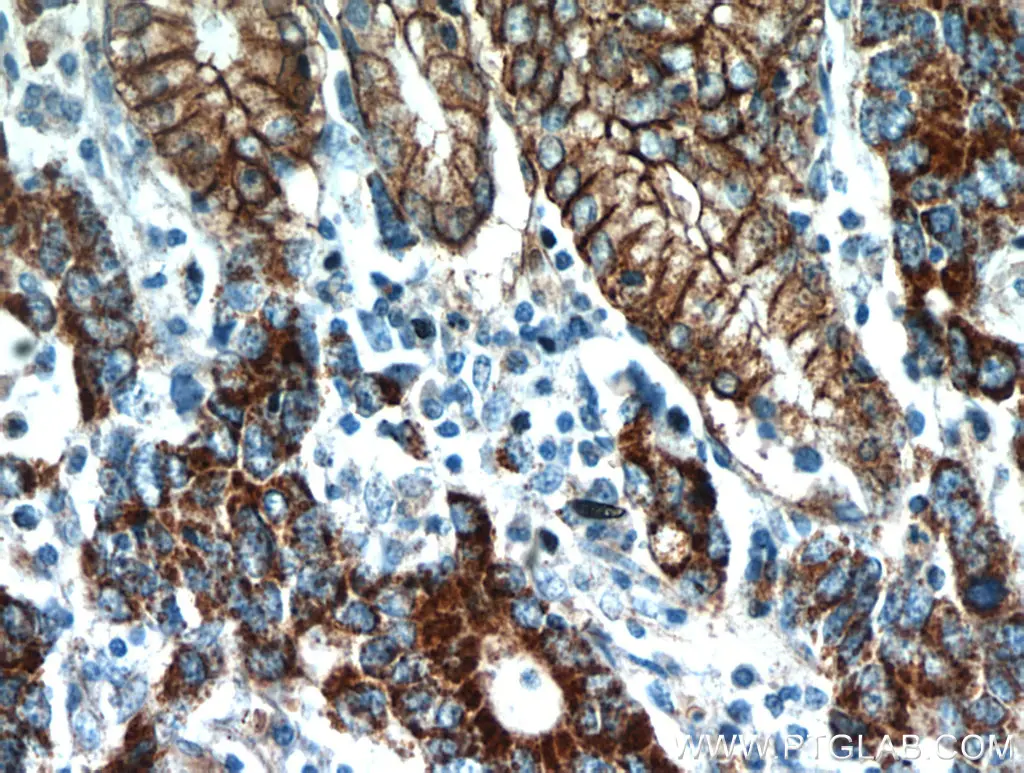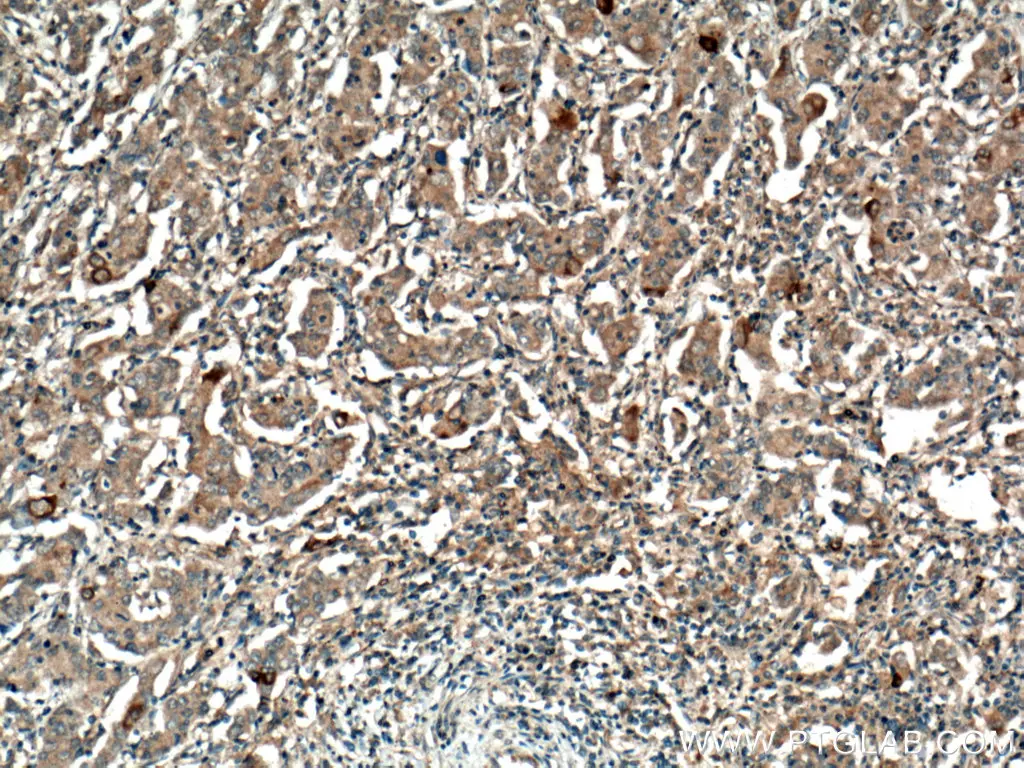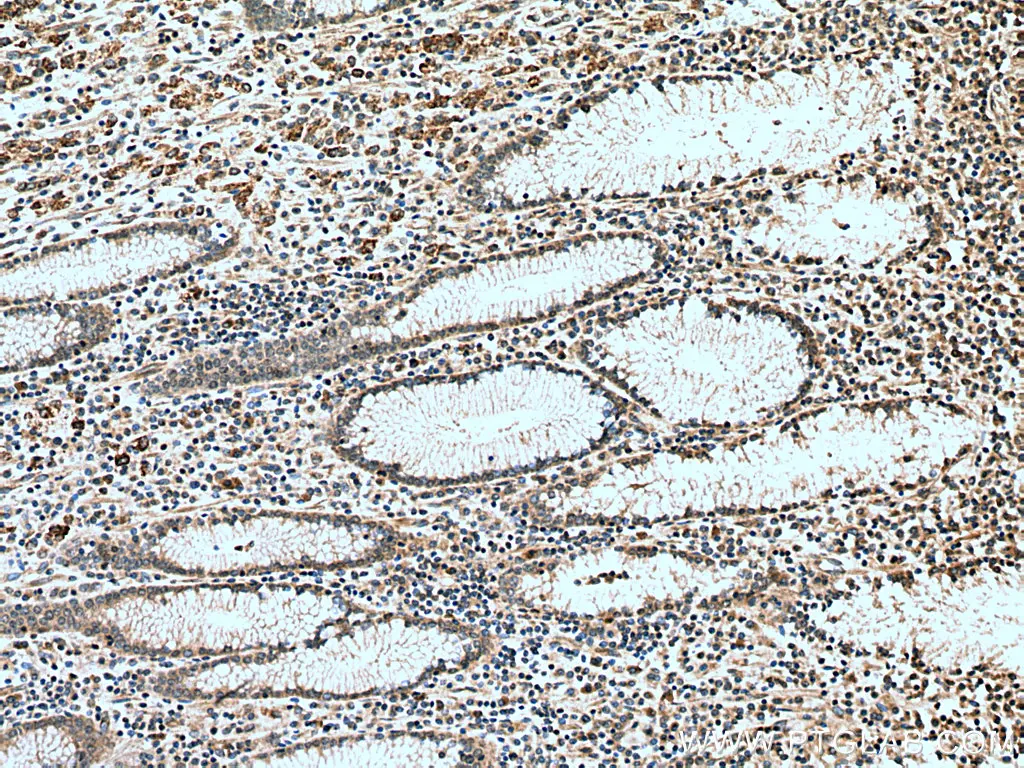Gastric Cancer
Travel through the gut with Proteintech and see for yourself how our unparalleled antibodies and IHC kits can help further accelerate your gastric cancer research
Introduction
Gastric or stomach cancer typically amounts to around 1.5% of new cancer cases in the US each year. It tends to be rather asymptomatic in the early stages, resulting in most cases being diagnosed after the disease has already progressed to a more advanced and invasive state, by which point the five-year survival rate is only 6%. It is also a heterogenous disease meaning that it can’t usually be treated with targeted therapies because each patient shows a different genetic profile. However, biomarkers can still be used for diagnosis, monitoring disease progression, and probing for recurrence after treatment. To aid researchers trying to better understand the molecular origins of this malignancy, Proteintech offers numerous antibodies and IHC kits against various gastric cancer targets.
Featured Markers
Claudin 18.2
Claudin 18.2 is an isoform of the Claudin 18 transmembrane protein that is specifically expressed in the stomach epithelium. In healthy gastric tissue, this protein is buried within the tight junctions and cannot be easily accessed by antibodies for purposes of detection or treatment. Cell transformation during gastric cancer, however, can result in altered morphologies that expose the protein on the cell surface. Therefore, Claudin 18.2 is being studied as an emerging biomarker for gastric cancer because an elevated signal in stomach tissue could be indicative of a developing tumor. There are also therapies being developed to specifically target this protein on gastric cancer cells. Proteintech’s Claudin 18 antibody can recognize both the 18.1 and 18.2 isoforms, allowing for successful detection of these proteins in multiple tissue types.

Immunohistochemical analysis of paraffin-embedded human stomach cancer using 21126-1-AP (Claudin 18 antibody) at dilution of 1:50 (under 40x lens).
MMP7
Matrix Metalloproteinase 7 (MMP7) is part of a broader family of enzymes that are known for their ability to degrade all components of the extracellular matrix. As degradation of the extracellular matrix is typically a prerequisite for tumor metastasis, MMPs are often overexpressed in several different cancers. Increased MMP7 expression has been specifically cited as a marker for gastric cancer metastasis. It induces the surface expression of Fas ligand on gastric cancer cells, which in turn can promote apoptosis of neighboring cells. It can also promote cell survival and regulate the activation of other adhesion-related proteins. Proteintech’s MMP7 antibody is the top cited in the market, featured in more than 70 publications worldwide.

Immunohistochemical analysis of paraffin-embedded human stomach cancer tissue slide using 10374-2-AP (MMP7 antibody) at dilution of 1:200 (under 10x lens).
SURVIVIN
Survivin is an inhibitor of apoptosis. While it is usually expressed at low levels in most healthy tissues, survivin is often present at excess levels in many different malignancies, including gastric cancer. This has been correlated with increased metastasis, poorer long-term survival, and higher rate of disease recurrence after treatment. Because its expression levels in cancer cells are significantly elevated when compared with normal cells, survivin could serve as an appealing target for anticancer therapies.

Immunohistochemical analysis of paraffin-embedded human stomach cancer tissue slide using 10508-1-AP (SURVIVIN antibody) at dilution of 1:400 (under 10x lens).
Antibodies for Gastric Cancer Research
|
Function |
Marker |
PTG Catalog |
|
Angiogenesis |
19003-1-AP |
|
|
Cell Cycle and Proliferation |
13042-1-AP |
|
|
18299-1-AP |
||
|
25869-1-AP |
||
|
10442-1-AP |
||
|
Cell Stemness |
15675-1-AP |
|
|
22018-1-AP |
||
|
10366-1-AP |
||
|
Cell Survival |
10701-1-AP |
|
|
10508-1-AP |
||
|
66248-1-Ig |
||
|
Cancer Type Differentiation |
11071-1-AP |
|
|
21126-1-AP |
||
|
Metastasis |
20077-1-AP |
|
|
10421-1-AP |
||
|
20874-1-AP |
||
|
17873-1-AP |
||
|
10374-2-AP |
||
|
10375-2-AP |
||
|
22989-1-AP |
||
|
18165-1-AP |
||
|
10745-1-AP |
IHC Kits for Gastric Cancer Research
|
Function |
Marker |
PTG Catalog |
|
Angiogenesis |
KHC0735 |
|
|
Cell Cycle and Proliferation |
KHC0079 |
|
|
Cell Stemness |
KHC0030 |
|
|
KHC0011 |
||
|
KHC0039 |
||
|
Cell Survival |
KHC0624 |
|
|
KHC0646 |
||
|
Cancer Type Differentiation |
KHC0187 |
|
|
KHC0063 |
||
|
Metastasis |
KHC0010 |
|
|
KHC0109 |
||
|
KHC0120 |
||
|
KHC0785 |
||
|
KHC0634 |
References
Matsuoka, T., & Yashiro, M. (2018). Biomarkers of gastric cancer: Current topics and future perspective. World Journal of Gastroenterology, 24(26), 2818–2832. https://doi.org/10.3748/wjg.v24.i26.2818
Verma, S., Kesh, K., Ganguly, N., Jana, S., & Swarnakar, S. (2014). Matrix metalloproteinases and gastrointestinal cancers: Impacts of dietary antioxidants. World Journal of Biological Chemistry, 5(3), 355. https://doi.org/10.4331/wjbc.v5.i3.355
Wang, T., Qian, X., & Liu, B. (2007). Survivin: Potential role in diagnosis, prognosis and targeted therapy of gastric cancer. World Journal of Gastroenterology, 13(20), 2784. https://doi.org/10.3748/wjg.v13.i20.2784
Zhang, J., Dong, R., & Shen, L. (2020). Evaluation and reflection on claudin 18.2 targeting therapy in advanced gastric cancer. Chinese Journal of Cancer Research, 32(2), 263–270. https://doi.org/10.21147/j.issn.1000-9604.2020.02.13
Related Content
Cancer stem cells as a key to cure cancer
Molecular markers for liver cancer

Support
Newsletter Signup
Stay up-to-date with our latest news and events. New to Proteintech? Get 10% off your first order when you sign up.
